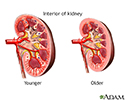Aging changes in the kidneys and bladder
The kidneys filter the blood and help remove wastes and extra fluid from the body. The kidneys also help control the body's chemical balance.
The kidneys are part of the urinary system, which also includes the ureters, bladder, and urethra.
Muscle changes and changes in the reproductive system can affect bladder control.
AGING CHANGES AND THEIR EFFECTS ON THE KIDNEYS AND BLADDER
As you age, your kidneys and bladder change. This can affect their function.
Changes in the kidneys that occur with age:
- Amount of kidney tissue decreases.
- Number of filtering units (nephrons) decreases. Nephrons filter waste material from the blood.
- Blood vessels supplying the kidneys can become hardened. This causes the kidneys to filter blood more slowly.
Changes in the bladder:
- The bladder wall changes. The elastic tissue becomes tough and the bladder becomes less stretchy. The bladder cannot hold as much urine as before.
- The bladder muscles weaken.
-
The urethra can become blocked. In women, this can be due to weakened muscles that cause the bladder or vagina to fall out of position (prolapse). In men, the urethra can become blocked by an enlarged
prostate gland
.
Prostate gland
The prostate is a gland that produces the fluid that carries sperm during ejaculation. The prostate gland surrounds the urethra, the tube through wh...
 ImageRead Article Now Book Mark Article
ImageRead Article Now Book Mark Article
In a healthy aging person, kidney function remains normal. But illness, medicines, and other conditions can affect kidney function.
COMMON PROBLEMS
Aging increases the risk of kidney and bladder problems such as:
-
Bladder control issues, such as leakage or
urinary incontinence
(not being able to hold your urine), or urinary retention (not being able to completely empty your bladder)
Urinary incontinence
Urinary (or bladder) incontinence happens when you are not able to keep urine from leaking out of your urethra. The urethra is the tube that carries...
 ImageRead Article Now Book Mark Article
ImageRead Article Now Book Mark Article -
Bladder and other
urinary tract infections
(UTIs)
Urinary tract infections
A urinary tract infection, or UTI, is an infection of the urinary tract. The infection can occur at different points in the urinary tract, including...
 ImageRead Article Now Book Mark Article
ImageRead Article Now Book Mark Article -
Chronic kidney disease
Chronic kidney disease
Chronic kidney disease is the slow loss of kidney function over time. The main job of the kidneys is to remove wastes and excess water from the body...
 ImageRead Article Now Book Mark Article
ImageRead Article Now Book Mark Article
WHEN TO CONTACT A MEDICAL PROFESSIONAL
Call your health care provider right away if you have any of the following:
- Signs of a urinary tract infection, including fever or chills, burning when urinating, nausea and vomiting, extreme tiredness, or low back pain
- Very dark urine or fresh blood in the urine
- Trouble urinating
-
Urinating more often than usual
Urinating more often than usual
Frequent urination means needing to urinate more often than usual. Urgent urination is a sudden, strong urge to urinate. This causes a discomfort i...
 ImageRead Article Now Book Mark Article
ImageRead Article Now Book Mark Article -
Sudden need to urinate (
urinary urgency
)
Urinary urgency
Frequent urination means needing to urinate more often than usual. Urgent urination is a sudden, strong urge to urinate. This causes a discomfort i...
 ImageRead Article Now Book Mark Article
ImageRead Article Now Book Mark Article
As you grow older, you will have other changes, including:
-
In the bones, muscles, and joints
In the bones, muscles, and joints
Changes in posture and gait (walking pattern) are common with aging. Changes in the skin and hair are also common. The skeleton provides support and...
 ImageRead Article Now Book Mark Article
ImageRead Article Now Book Mark Article -
In the male reproductive system
In the male reproductive system
Aging changes in the male reproductive system may include changes in testicular tissue, sperm production, and erectile function. These changes usual...
 ImageRead Article Now Book Mark Article
ImageRead Article Now Book Mark Article -
In the female reproductive system
In the female reproductive system
Aging changes in the female reproductive system result mainly from changing hormone levels. One clear sign of aging occurs when your menstrual perio...
 ImageRead Article Now Book Mark Article
ImageRead Article Now Book Mark Article -
In organs, tissues, and cells
In organs, tissues, and cells
All vital organs begin to lose some function as you age during adulthood. Aging changes occur in all of the body's cells, tissues, and organs, and t...
 ImageRead Article Now Book Mark Article
ImageRead Article Now Book Mark Article
References
Griebling TL. Aging and geriatric urology. In: Wein AJ, Kavoussi LR, Partin AW, Peters CA, eds. Campbell-Walsh Urology . 11th ed. Philadelphia, PA: Elsevier; 2016:chap 88.
Smith PP, Kuche GA. Aging of the urinary tract. In: Fillit HM, Rockwood K, Young J, eds. Brocklehurst's Textbook of Geriatric Medicine and Gerontology . 8th ed. Philadelphia, PA: Elsevier; 2017:chap 22.
Walston JD. Common clinical sequelae of aging. In: Goldman L, Schafer AI, eds. Goldman-Cecil Medicine . 25th ed. Philadelphia, PA: Elsevier Saunders; 2016:chap 25.
-
Urinary incontinence
(In-Depth)
-
Benign prostatic hyperplasia
(In-Depth)
-
Urinary tract infection
(In-Depth)
-
Benign prostatic hyperplasia
(Alt. Medicine)
-
Back pain and sciatica
(In-Depth)
-
Osteoporosis
(In-Depth)
Review Date: 8/22/2016
Reviewed By: Laura J. Martin, MD, MPH, ABIM Board Certified in Internal Medicine and Hospice and Palliative Medicine, Atlanta, GA. Also reviewed by David Zieve, MD, MHA, Isla Ogilvie, PhD, and the A.D.A.M. Editorial team.

